Hey! My name's Stevie and I'm a year 12 student in Australia trying to get a good ATAR and learn a tonne
Don't wanna be here? Send us removal request.
Text
How I studied Anatomy & Physiology
Anatomy:
I’ve said it before & I’ll say it again, Netter is one of a kind guys. It has helped me so much.
There’s also an app I used to have on my iphone, I think it was called essential skeleton. Any app/program would do, I especially love the virtual dissection tool because it helped me understand different layers so much better.
It can get a little overwhelming with the details but there’s usually a “clinical anatomy” or “applied anatomy” part in the end of every chapter, I prioritized that over everything else because of its clinical relevance and this has not only helped me in my rotations this year but also MCQs in academic usually target this area so .. you’re welcome hahah.
The lab is your best friend here, take advantage of every minute you have in there. Understanding is key so for example if I didn’t fully understand the action of a muscle, I’d pull the tendon & see what it does with my own eyes, what I’m saying is I never left the lab without understanding everything because anatomy isn’t one of those things you can just memorize.
If your school provides a pre lab learning guide use that, if it doesn’t make your own. Just don’t go into the lab not knowing anything because you will struggle, whereas if you go prepared it’s gonna help you out a ton, you’ll consolidate everything you know & basically be good to go.
So here’s what I did to learn an anatomy lecture: Before the class I’d read what we’re studying from Snell’s, then I’d take notes, attend the lecture, go home, go over everything from Netter & my apps (I considered that my pre lab work) and then the next day I’d go into the lab & sort of explain whatever we’re learning either to myself or to my partner. Et voilà, we’re done.
Physiology
This wasn’t really my forte, but here goes nothing.
As for physiology I found that textbooks don’t do it for me.
So what I would do before class to prepare is watch as many YouTube videos from different sources about whatever we’re studying. I could link all my favorite YouTube channels if you’re interested?
Then in class I’d pay FULL UNDIVIDED attention (physiology needs more concentration imo)
Then I’d get home and go through the material my school provides, I didn’t even make my own notes in physiology because it was ridiculously time consuming & I needed visual illustrations. Reading it was like passive studying, I couldn’t learn anything no matter how many times I read it.
But the one thing that I found helped me the most in physiology is answering a shit ton of MCQs, that’s the only way I could properly learn.
So my strategy for physiology was basically pay full attention in class & do a lot of practice questions rather than spend hours memorizing everything from a textbook.
For the anon who wanted this that’s pretty much everything I did regarding these two. Hope you found it helpful!
3K notes
·
View notes
Text
STUDY AREA
Having a motivated work place is key. Here are some ways to improve your study area.
Keep a clean, tidy desk
Use an oil diffuser to motivate yourself
Light a candle while you study
Get a motivation board
Keep a list of what you need to do
Stick post it notes on the wall
Get a whiteboard
Stick inspirational quotes everywhere
Get some cute plants
Keep water nearby
Healthy snacks to eat while you study
Make sure you have all the stationery you need
Stack up your books
Study well!
2K notes
·
View notes
Text
How to study (when you really don’t want to)
1. Have a snack or drink (or both!) that you really like next to you while studying. Save this for after you’ve done half an hour of work. Having a short term reward should make you way more motivated!
2. Tell yourself that you’re going to do ten minutes of work. Because this is such a short time, you’ll feel much more comfortable committing than you would if you forced yourself to do an hour of work. Plus, once you’ve completed ten minutes, you’ll be in the swing of things and me much happier to continue.
3. Stay after school to study. I don’t know if this is just me, but I find it way easier to study at school than at home. The library at my school is always quiet, plus the school blocks social media so I can’t be distracted by my phone! Also, your mind has associations of learning while you’re at school, whereas your brain associates your room with things like sleep, which isn’t very productive!
4. Take regular breaks. If you work solidly for two hours, you’re going to get tired quickly, which won’t help you in the long run. You may want to get your daily revision done, but being exhausted while doing it won’t help you retain any knowledge. It’s much better to work for half an hour, then take a ten minute break, and repeat that until you’ve completed everything you wanted to complete. Besides, taking time away from work helps you learn.
5. Have fun! There’s no point reading for ages out of a text book, as you’re only going to get bored and zone out. It’s best to do the revision you find most interesting. If you’re artistic, that might be making a poster or a mind map. You might enjoy online quizzes. Or, you might want to create a presentation. There are so many different ways to study, and it doesn’t have to be boring!
3K notes
·
View notes
Text
some study tips from my psychology teacher 📖
STOP Cramming
cramming is good for the short term, such as just before a test (i’m talking like an hour before), but shouldn’t be used as an effective study method. you only learn the information in the exact way you read it, so any practical application on your test won’t be easy to answer. you also will struggle with answering the same questions you studied for, but asked differently.
Spacing Effect
the spacing effect is essentially the opposite of cramming. instead of doing a 4 hour study session, break it up into groups of 30 minutes. do 30 minutes, take a nice long break, go back for 30, and repeat. that break in between gives your brain time to encode and store the information. this can be done in either one day, or over the course of a few days before the test.
Mnemonic devices are your best friend when dealing with lists of information
any sort of rhyming scheme, letter association, acronyms, etc. is proven to help you. any american can say ROY G. BIV and know exactly what they’re talking about, another example is HOMES for the great lakes. another major example is “Please Excuse My Dear Aunt Sally”/PEMDAS for the order of operations. this helps with lists, i use it all the time in biology for stuff like the Levels of Classification or Characteristics of Living things. for AP Euro i remember “Descartes with a D” because he “Doubts and wrote Discorse on Method”.
Hierarchy Organizing for Midterms and Finals
by breaking information down into a hierarchy, you can figure out how to study all your chapters at once. these are often called “graphic organizers” and it takes the whole topic, then breaks it into subsections, then subsections of those subsections. here’s an example i found for my Memory unit

the whole unit is memory, the subtopics are sensory memory, short term, then long term. then comes the subdivisions of long term memory and so on. this is wonderful for study planning in regards to large information tests.
these are just some of the tips we talked about, and obviously they won’t work for everybody, but it’s really helped my studying process because it’s literally how the brain processes information best for long term storage and retrieval.
5K notes
·
View notes
Text
20 important study skills/tips i’ve learned from my professors
1. start studying a week before every quiz/test. seriously.
2. watch youtube videos/ted talks on the topics you are learning about.
3. get lots of sleep! sleep helps you process the day’s events, including what you learned.
4. write out your notes. it’s proven that handwritten notes help you learn better than typed out notes.
5. don’t just read what your professor gives you. find academic journals, books, etc. that correspond with your subjects.
6. read the news! especially in the social sciences/humanities, connecting concepts with current events helps you understand and process more easily.
7. exercise! this doesn’t have to be going on runs or lifting weights, it could even just be going for a 20 minute walk. just get your blood pumping, it’ll help you focus.
8. study at your desk. it may be tempting to study in bed, but your brain connects your bed with sleep, so you’ll get tired more quickly.
9. reviewing notes doesn’t have to be something you sit down and do for an hour. skim through them and test your memory while eating breakfast!
10. expand your study time throughout the day to avoid burnout. for example, rather than studying for 5 hours straight, study for an hour here and there in between your activities.
11. make your notes organized and easy to read, but not distracting. bright colors and flashy notes may seem better, but can sometimes distract from the purpose of the notes.
12. use apps such as quizlet. this way, you can go through definitions while waiting in lines or walking to class.
13. it’s more important to know concepts rather than facts. for example, you should be able to take what you know and apply it to different situations, not just the situation the textbook gives you.
14. just because the professor doesn’t require you to read textbook, doesn’t mean you shouldn’t. it helps explain concepts in a different way than your professor, and a lot of times hearing two different explanations for the same concept helps you understand it.
15. read in advance. read the textbook before your professor begins going over the chapter, so when he/she does, you can easily follow what they are saying.
16. do any extra credit work that comes your way. even if you don’t need the extra boost now, you might later.
17. go to class!! if you always skip class and show up at office hours completely lost on the concepts, they’ll laugh in your face. they’ll take you 100x more seriously if you show up.
18. however, if you are sick, take a day off. it’s more beneficial to you in the long run.
19. learn how to say “no”. if you have an 8 am the next day, don’t stay out until midnight with your friends.
20. don’t stress too hard over quizzes. if you expect them to go horribly, they will. you got this.
35K notes
·
View notes
Text





A bedroom.
567 notes
·
View notes
Photo
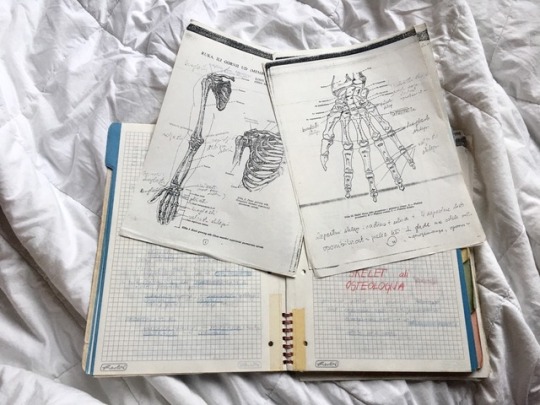
21.9.2017// Thinking of med school which starts in one week and I so sooo can’t wait I am just so excited!! ft. notes that I took for bio competition this year ✨
11K notes
·
View notes
Text


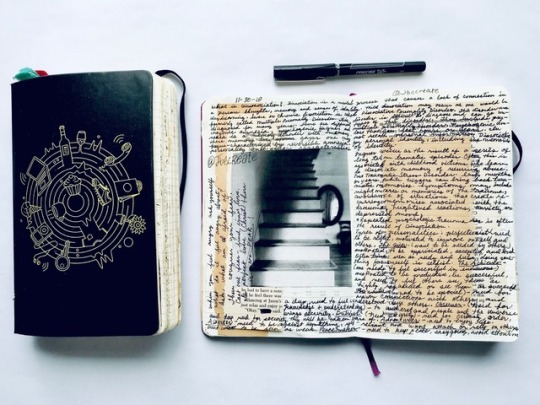
A Peacemaker- a person who’s easy going, and avoids attention, has a deep desire for keeping peace.
Quiescent- a quiet, soft spoken soul.
882 notes
·
View notes
Photo
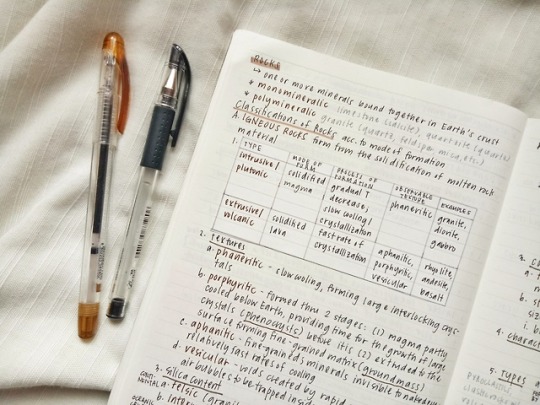

31/100 days of productivity - august 10, 2018
5K notes
·
View notes
Text
a honest study guide
As I am usually a straight A student, I thought I’d share some of my favourite study “hacks”, but be warned: i will not be gentle with you. I am going to tell you the brutal truth about getting great marks, because it is no use sugarcoating the fact that school is actually super hard work!
discipline beats motivation
to be honest no matter how perfect your/any studyblr might be, looking at a blog will unfortunately never ever motivate you to study as hard as you will have to to get an A. Studyblrs may inspire you, but the one thing which will really get you studying is discipline. So, as cruel as it may sound, force yourself to be productive and you will get some serious work done.

have no social life
… at least on some days. if you find it difficult to fit your studies into your social life, try reversing the whole thing. Don’t make plans with your friends on days during which you want/need to study. This definitely isn’t fun, I know, but for me, I often find it difficult to get work done when I have plans later that day as firstly, getting a certain amount of work done within a strict time limit stresses me out and secondly, you should definitely use all the time you can get - especially shortly before the upcoming exam.

all-nighters equal bad time management
truth be told good students normally won’t have to pull all nighters as sleep is very important for not only your concentration but also for your health. To make sure that you get enough rest you should start studying as early as possible, for me that is normally one week before the particular exam, and plan what you will do on which day without trying to fit everything into the last minute. That will leave you relaxed, well rested and concentrated on the day of your exam.

find something that keeps you going
i usually drink a lot of coffee when i am studying, because during a hard study session i need to stay focused and awake. If you don’t like coffee, you could also go for black tea or green tea or simply some fruit as it is very important to get some vitamins (or in my case caffeine) in your system to not fall asleep while working.

ask for help
whether you swap notes with your colleagues or you mail the professor some questions doesn’t matter at all. It’s only important that you accept that you probably won’t be able to do everything on your own, so find yourself a study partner, ask questions when something seems unclear to you or even get a tutor. And definitely don’t be embarrassed about asking questions! Nobody knows everything.

no distractions
studying is boring and you might find that music makes it a little more exciting, but often listening to music or taking a lot of breaks is only keeping you from getting work done. So suck it up and study either silently, to classical music or to relaxing noises you can find on the internet. Also try not to take too many breaks. Don’t overwork yourself, of course, but also try to stay focused for longer than 15 minutes as this will allow you to be more productive and don’t study with friends if you end up chit-chatting to each other instead of working.

write everything down
even if you have a good memory, you won’t be able to remember a thing after class, so suck it up, don’t talk to your desk mate and focus on writing everything important down what the teacher says. even if you get handed enough material there will still be things which you should write down such as explanations, examples and additional information. that will help you later on to understand what you are actually studying.

you absolutely need to study
don’t ever think, no matter how much attention you’ve paid in class or how good you are at a certain subject, that you won’t have to study. there is always work to get done and if you are already good at something work on being better to excel at academics.

(i added fun gifs, because it seemed a little too harsh - good luck, babes, you are going to pass your exams)
#study help#study#studying#study ideas#study hacks#study tips#study habits#motivation#studyblr#queue
8K notes
·
View notes
Text
College Survival Tips
1. Don’t schedule classes before 9:30
2. use study resources
3. GO TO CLASS
4. always bring headphones
5. find a coffee shop
6. always carry a snack
7. print out lecture slides
8. steal bananas and fruit from the dining halls
9. bring a water bottle everywhere
10. sit near the front of your classes
11. find a study parter (emphasis on only one other person!!!)
12. never forget a phone charger
13. learn the bus system
14. say yes to anything you’re passionate about
15. learn to spend time alone
#study#studying#study tips#college tips#study hacks#study ideas#study help#college help#study habits#studyblr#queue
11K notes
·
View notes
Photo

lol I forgot this photo existed but here’s my weekly set-up from last month! november was definitely a low moment, I felt rlly stressed 😞 but I’m excited for the new year! ⠀⠀⠀⠀⠀⠀⠀ posted on Instagram - http://bit.ly/2QdGez4
#studyspo#studyspiration#study#studying#study aesthetic#bujo#bujo love#bullet journal#bujo inspo#bujo spread#bujoinspo#studyblr#queue
458 notes
·
View notes
Photo
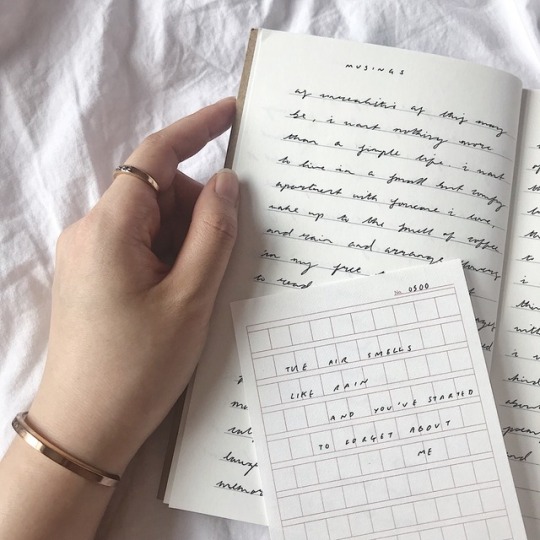

ig: studylustre
6K notes
·
View notes
Text
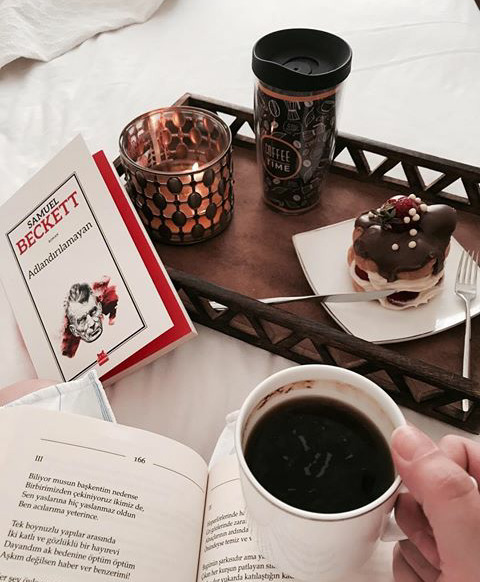
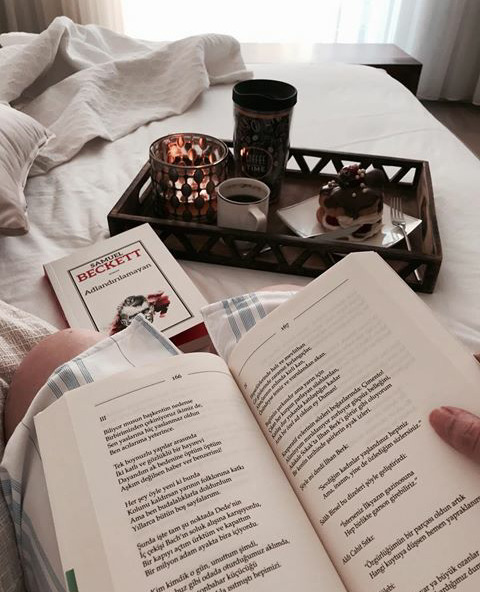
3K notes
·
View notes
Photo
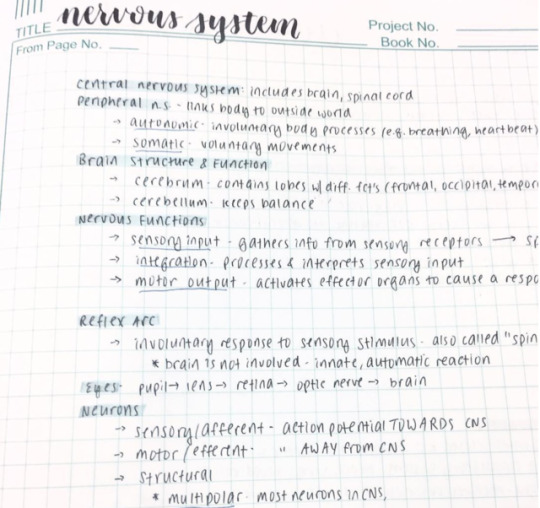
bio notes // happy winter break everyone !
618 notes
·
View notes
Photo

withniki
7K notes
·
View notes
Photo
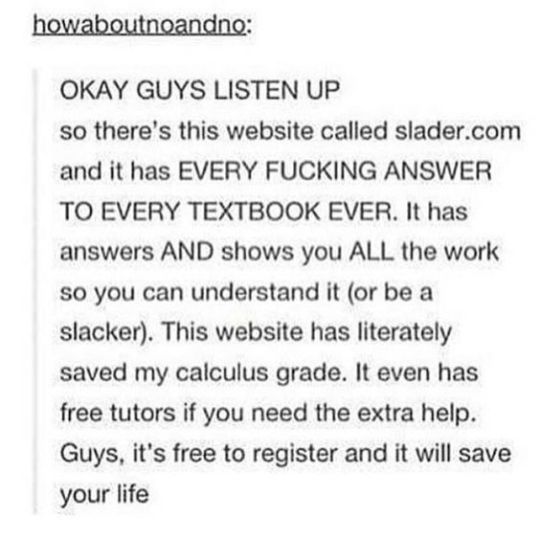
Reblog it and save a life !
15K notes
·
View notes